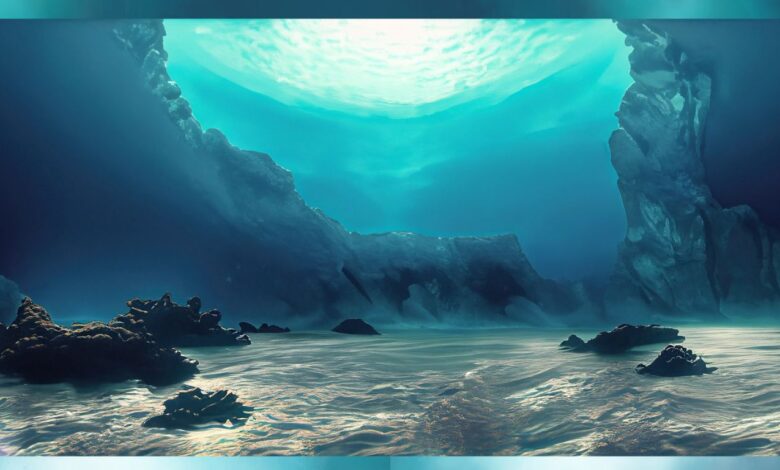At the bottom of Ocean, this sound was captured forty years ago: Nobody is willing to go down.

At the bottom of Ocean: For more than forty years, sailors and scientists have been perplexed by an enigmatic sound coming from the water. What sounds like a duck but also has an unearthly aspect has eluded recognition. Researchers are hard at work trying to figure out what it means and where it came from. But there no one is brave enough to go down to the depths where it was first recorded.
At the ocean’s bottom Bio-duck: The deep ocean’s enigmatic sound
This peculiar sound, called the “bio-duck,” was initially captured in the South Fiji Basin in the Pacific Ocean in July 1982. The term describes a set of low-frequency pulses that were found by researchers in New Zealand while conducting an ocean acoustics investigation.
Initially, researchers were perplexed by the sound and hypothesized that it might have a mechanical origin due to its loudness and repetition. As a result, the peculiarity of these pulses has sparked discussions among researchers attempting to pinpoint the bio-duck’s origin.
According to a 2013 study by marine biologist Denis Risch of the National Oceanic and Atmospheric Administration in Silver Spring, Maryland, the sound was common in the Southern Ocean in the winter. She also underlined its importance, saying it was too methodical and loud to ignore.
Risch remarks, “It almost sounds mechanical.” Therefore, it’s quite loud and widespread, yet at first you wouldn’t realize it was an animal.
Advancements in acoustic technology enhance understanding of the bio-duck phenomenon
Ross Chapman, an underwater acoustics researcher at the University of Victoria in British Columbia, Canada, re-examined the recordings in the years following the bio-duck’s discovery. Chapman’s research concludes that the noises most likely result from biological activity produced by coordinated marine communication.
Researchers used an acoustic array, a system of hydrophones towed behind a ship, to record the bio-duck sounds, indicating a complicated form of interaction among multiple speakers.
According to Chapman, “we found that there were typically multiple speakers at various locations in the ocean, and all of them [made] these sounds.”
He added, “The other speakers were silent, as if they were listening, when one speaker was speaking.” After that, the first speaker would pause and listen to other people’s reactions. They might have been discussing supper, parents conversing with kids, or they might have just been making remarks about that strange ship that kept circling back and forth while pulling that long string behind it.
Are minke whales the key to deciphering the bio-duck in the Ocean?
Decades of research into the bio-duck conundrum have raised questions about marine species communication.
Recent research has discovered similar sounds in the waters near Australia and New Zealand. This also suggesting that marine species have a complex social network where they share information. This discovery surprisingly reveals a level of interaction and intelligence at the ocean’s depths that scientists had previously underestimated.
Early hypotheses have suggested that Antarctic minke whales are the source of these sounds. However this has not been verified visually. Scientists recognize minke whales for their complex vocalizations.Researchers could gain insights into minke whales’ social relationships and environmental communication through studying their vocalizations, but they need more evidence to support these claims.
Researchers generally believe that the bio-duck sounds originate from biological sources, rather than mechanical causes or otherworldly powers, although the exact origin remains unknown.
Ultimately, the bio-duck serves as a reminder of the ocean’s many secrets. The strange yet captivating sound represents the unexplored and undocumented areas that remain. With their elusive animals and undiscovered treasures, the oceans continue to be one of our planet’s last frontiers. Such marvels do, in fact, act as a catalyst for our curiosity.
Also Read:
Research on the Mouse Brain Could Reverse Centuries-Old Understanding of Axon Shape
Self-Transformation, Self-Development, Process, Techniques
Scientists think that planets with underground oceans could support life and hide it
Follow us on:
Click here to go to the Homepage
Keep Tuned with mojbuzz.com for more Entertainment
Note: Denial of accountability! MojBuzz.com is a computerized aggregator across the world of media. All of the content material can be found free on the Web. We have now simply organized it in a single platform for academic objectives solely. In every content material, the hyperlink to the first supply is specified. All emblems belong to their rightful homeowners, all supplies to their authors. If you’re the proprietor of the content material and are not looking for us to publish your supplies on our website, please contact us by e-mail – help@mojbuzz.com. The content material will probably be deleted within 24 hours.




